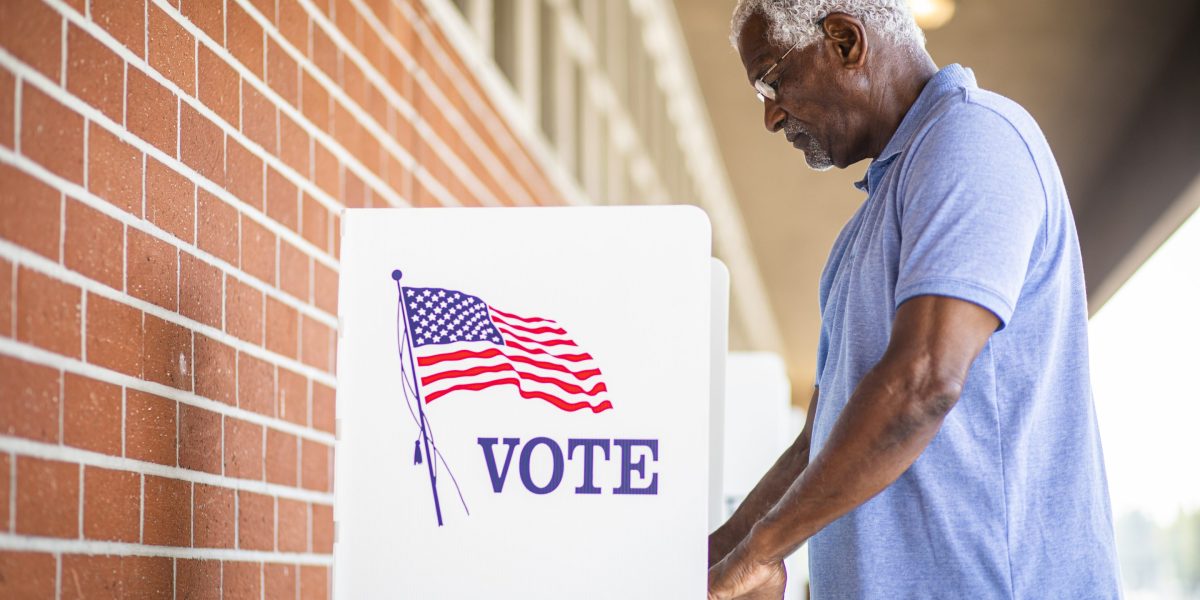Neither former President Donald Trump nor Vice President Kamala Harris has said much about Medicare during the 2024 campaign, though both have employed scare tactics about what the other would do to the program. But which candidate wins in November could have a major impact on Medicare and its beneficiaries.
“I think any election is potentially significant for Medicare, based on who’s in power and their philosophies about health care and the best sources to provide health care,” says David Lipschutz, co-director of the Center for Medicare Advocacy.
Gretchen Jacobson, vice president of Medicare at the Commonwealth Fund health research group, says: “There are challenges that Medicare is facing that will be faced by the administration regardless of which administration.”
Experts don’t expect a radical alteration of Medicare under either Trump or Harris, despite Trump’s threat that Harris would institute a “socialist Medicare for All” and Harris saying, “We’re not going to go back to when Donald Trump tried to cut Social Security and Medicare.”
Peter Earle, a senior economist at the American Institute for Economic Research, offers this big-picture assessment: “I think if Harris becomes president, Medicare is probably going to expand in scope. I would characterize my expectations of what Trump would do is to make cuts around the edges and streamline things, but not eliminate them.”
Trump, Earle adds, “has to be very careful about alienating one of his core constituencies, which are baby boomers.”
There are five ways Medicare could change depending on who gets elected: the scope of Medicare, the importance of private insurers’ Medicare Advantage plans, prescription drug costs, the enrollment eligibility age and Medicare’s impending solvency problems.
Here’s a look at each, based on: what experts expect, what the candidates and their party platforms have said and what’s in the conservative Project 2025 report.
The scope of Medicare
Harris has backed away from her 2019 proposal for a single-payer health insurance system dubbed Medicare for All. “I think that’s probably more reflective of where the country is, in terms of looking for ways to improve the current system,” says Andrea Ducas, vice president of health policy at CAP Action, a progressive, nonpartisan policy institute and advocacy organization.
But experts believe Harris would like to broaden what Medicare does cover.
The Democratic platform said: “We’ll look to expand traditional Medicare coverage to include dental, vision, and hearing services…by making the wealthy and big corporations pay their fair share.” (Some private Medicare Advantage plans already offer dental, vision and hearing coverage.)
To date, Congress has been unwilling to expand Original Medicare’s array of benefits to include dental, vision and hearing due to the cost to the program of doing so. But experts think a Harris administration and a Democratic-controlled Congress would make chances for adding this coverage greater than ever.
Lipschutz sees momentum particularly behind adding dental coverage to Original Medicare.
Trump said he “will not cut one penny from Medicare” and hasn’t suggested expanding the program. During his administration, Trump proposed four annual budgets proposing reduced Medicare spending.
The 2024 GOP platform language vaguely noted only that Republicans would “protect Medicare and ensure Seniors receive the care they need without being burdened by excessive costs.”
The importance of Medicare Advantage plans
When enrolling in Medicare, you can choose between Original Medicare (Parts A and B) or a Medicare Advantage plan (Part C). Slightly over half of beneficiaries are in Medicare Advantage plans, which often cost them less than Original Medicare plus a supplemental Medigap plan, but restrict which doctors and hospitals are in-network and require prior authorization to see specialists.
Prior authorization “could cause more Medicare Advantage patients to pay out of pocket for denied or delayed services,” Dr. David Blumenthal and Gretchen Jacobson recently wrote in the Journal of the American Medical Association.
“We’ve seen bipartisan support for private plans and Medicare for many, many years, and over time we’ve seen that the Democrats tend to focus more on consumer protections,” says Jacobson. “Republicans have been focused more on providing leeway and the resources for markets to innovate and be competitive.”
Harris hasn’t talked about Medicare Advantage plans during the campaign; the Biden administration cracked down on some of their misleading marketing tactics.
When Trump was president, his administration broadened private health insurers’ Medicare Advantage plans in several ways, including increasing their telehealth access and expanding supplemental benefits for members with chronic diseases.
“We could possibly see a greater acceleration of the privatization of the Medicare program under a Trump administration,” says Lipschutz.
Project 2025 (which Trump has distanced himself from, but many of its authors have close ties to him) called for making Medicare Advantage plans the default option for people enrolling in Medicare. “It’s plausible that Trump would support making Medicare Advantage the default,” says Earle.
Exactly how that would be done is unknown. But James Capretta, senior fellow at the American Enterprise Institute, says he could imagine Medicare enrollees being required to talk with a government official about Medicare Advantage and Original Medicare before choosing between the two.
Medicare Advantage plans cost the government and taxpayers more than Original Medicare on a per beneficiary basis, according to the Commonwealth Fund.
Lipschutz believes there will be heightened financial pressure on Medicare if current payment rates continue and Medicare Advantage membership grows due to a Trump push for the plans. “The more people enroll in Medicare Advantage, the more it’s going to strain the Medicare program’s financing,” he says.
Prescription drug costs for Medicare beneficiaries
The Biden-Harris administration considers its Inflation Reduction Act, aimed at lowering prescription drug costs for people on Medicare, a signature effort. That law lets Medicare negotiate with pharmaceutical companies on the price of popular and expensive prescription drugs starting in 2026 and cap beneficiaries’ out-of-pocket costs for covered prescriptions at $2,000 beginning in 2025.
An AARP study said more than 3 million Medicare beneficiaries will benefit from the $2,000 cap next year, with more than half saving $1,000 or more annually. (Some health insurers are expected to boost premiums and restrict drug coverage due to this law change, though.)
Harris has said she wants to accelerate the drug-price negotiation program and the Democratic platform called for a $2 cap on a month’s life-saving generics for people on Medicare.
Trump has been a proponent for lower prescription costs and, while president, tried to permit the importation of lower-priced medications from Canada before being rebuffed by the Canadian government.
But Project 2025 called for the repeal of the Inflation Reduction Act. Capretta doubts Trump would try to repeal the entire law. And repealing the $2,000 cap? “Not a chance,” he says.
Lipschutz agreed. “I think it would be an uphill battle to try to repeal the Inflation Reduction Act. It’s a popular policy to cap prescription drug costs at $2,000.”
Medicare eligibility age
Currently, Americans become eligible for Medicare at age 65. When Biden ran for president, he proposed lowering the age to 60. Earle thinks Harris might favor that idea. Trump hasn’t suggested dropping the eligibility age.
A major stumbling block to lowering the age: it put added financial pressure on an already stressed Medicare system. Analysts don’t think Trump or Harris would raise Medicare’s eligibility age even though Congress, in 1983, gradually upped Social Security’s Full Retirement Age from 65 to 67.
“I think raising it is out of the question because it’s very politically unpopular,” says Capretta. Lipschutz called raising Medicare’s age “pretty fraught.”
Medicare’s solvency
Medicare’s trustees forecast potential financing problems starting in 2036 for what is one of the government’s fastest growing programs. The pinch would be felt by Medicare’s Part A Hospital Insurance Trust Fund, financed through payroll taxes.
If the projections prove accurate and Washington doesn’t address the solvency woes, Medicare could only cover 89% of Part A costs through payroll tax revenues in 2036.
Medicare Parts B and D (for doctor’s costs and prescriptions) are kept afloat through general revenues and beneficiary premiums, so they’re not expected to run into solvency issues.
The Medicare solvency date could come sooner than 2036. “The solvency of the trust fund is highly influenced by the economy and by the taxes coming into the fund and there could be changes to the program, or the use of services, that may affect the solvency of the trust fund without the administration taking any direct action,” says Jacobson.
Keeping Medicare solvent is a serious worry for Americans.
In a recent NerdWallet survey, 74% of respondents in Medicare said they’re concerned about Medicare benefits being reduced in their lifetime; 35% under 65 didn’t believe Medicare benefits would be available when they turn 65.
Those findings echo the West Health-Gallup Survey on Aging in America, where 73% of people under 65 worried Medicare wouldn’t be available when they need it.
“I think that people might be overly worried,” says Elizabeth Ayoola, personal finance writer at NerdWallet.
Neither Harris nor Trump has talked about how—or even whether—they would address Medicare solvency.
Biden’s 2025 budget, however, said it would extend Medicare’s Hospital Insurance trust fund solvency “permanently” by increasing the Medicare tax rate from 3.8% to 5% on incomes over $400,000, among other things.
The 2024 Republican platform vowed to “strengthen Medicare for future generations,” but didn’t offer specifics.
The Democratic platform noted only that Medicare is in a stronger fiscal position than when Biden took office and that the nation’s “strong economic recovery” has helped extend Medicare solvency by a decade.
”The candidates probably aren’t going to be dealing with Medicare in terms of reform and solvency. I view that as a big, missed opportunity for the country,” says Capretta. “The country really does need to rethink some fundamental things about how to finance these big programs.”
The upshot for voters
When it comes to the election and Medicare, NerdWallet’s Ayoola offers this advice: “It’s easy for politicians to put policies out there and say what they will or will not do. But ultimately, you have to take your own health care into your own hands. You have to decide, ‘I’m going to calculate how much my future health care needs are going to be and irrespective of what policies are passed, I have enough to manage my own health care costs as I continue aging.’”
- The Well Adjusted newsletter: Sign up to get simple strategies to work smarter and live better, in your inbox three times a week.



